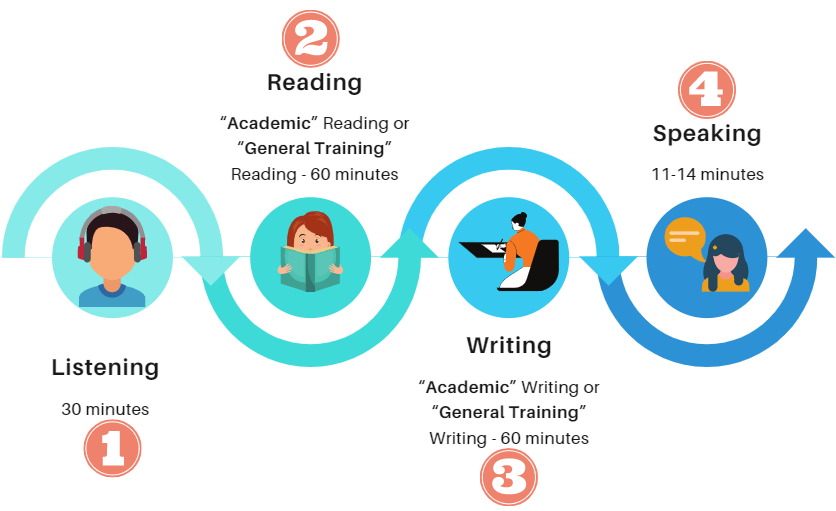IELTS: Academic and General Training
Academic Module:
If you want to study at the undergraduate or postgraduate level, or if you want to be a doctor or a nurse, this is the option for you. Learn more about the IELTS Academic module.
General Training Module:
If you want to migrate to an English-speaking nation (for example, Australia, Canada, New Zealand, or the United Kingdom), or if you want to train or study at a lower level, this is the option for you. Learn about the IELTS General Training module.
Both sort of tests have these components, they are going to differ from each other on the details on their scope.
1. Listening (30 minutes)
You'll listen to four recordings of native English speakers and then respond to a series of questions in writing.
- Recording 1 is a conversation between two people that takes place in a normal social setting.
- Recording 2 – a monologue in a common social setting, such as a speech about local amenities.
- Recording 3 - an educational or training talk involving up to four persons, such as a university teacher and a student discussing an assignment.
- Recording 4 - a monologue about a topic related to academia, such as a university lecture.
Assessors will be looking for evidence of your ability to comprehend primary ideas and detailed factual information, as well as speakers' viewpoints and attitudes, the goal of an utterance, and evidence of your capacity to communicate effectively.
2a. Academic Reading (60 minutes)
The Reading part contains 40 questions that are designed to assess a variety of reading abilities. Reading for gist, key ideas, detail, skimming, understanding logical argument, and recognising writers' viewpoints, attitudes, and intent are all examples.
The IELTS Academic test consists of three long texts ranging from descriptive and factual to argumentative and analytical in nature. These quotations are from books, journals, periodicals, and newspapers. They were chosen for a non-specialist audience, although they are also ideal for students starting university courses or seeking professional registration.
2g. General Training Reading
The Reading part contains 40 questions that are designed to assess a variety of reading abilities. Reading for gist, key ideas, detail, skimming, understanding logical argument, and recognising writers' viewpoints, attitudes, and intent are all examples.
Extracts from books, periodicals, newspapers, notices, advertising, company handbooks, and guidelines are included in the IELTS General Training test. In an English-speaking environment, you are likely to come across these things on a daily basis.
3a. Academic Writing (60 minutes)
Test takers beginning undergraduate and postgraduate degrees, as well as those seeking professional registration, will find the topics of general interest and suitability. There are two tasks to complete:
Task 1: You will be given a graph, table, chart, or diagram and asked to describe, summarize, or explain it in your own words. You may be requested to describe and explain data, process phases, how something works, or a specific object or event.
Task 2 entails writing an essay in response to a point of view, argument, or problem. Both tasks must be completed in a formal manner.
3g. General Training Writing (60 minutes)
The topics are interesting to a wide range of people. There are two tasks to complete:
Task 1: You will be given a situation and will be required to compose a letter asking information or describing the circumstance. The letter might be written in a personal, semi-formal, or official tone.
Task 2 entails writing an essay in response to a point of view, argument, or problem. In terms of style, the essay can be quite personal.
4. Speaking (11–14 minutes)
The speaking component evaluates your ability to communicate in English. Every test is kept track of.
- Part 1: The examiner will ask you broad questions about yourself and a variety of familiar themes like home, family, work, studies, and hobbies. This section lasts about four to five minutes.
- Part 2: You'll be handed a card that asks you to discuss a certain topic. Before speaking for up to two minutes, you will have one minute to prepare. After that, the examiner will ask one or two questions on the same subject.
- Part 3: You'll be asked more questions about the topic discussed in Part 2. These will allow you to talk about more abstract concepts and issues. This section of the lasts 4-5 minutes.
- Marking (Listening and Reading)
| Marking: | Each correct answer receives 1 mark. Your final score is given as a band score from 1–9 in whole or half bands |
- Marking (Writing)
There are four assessment criteria:
- Task achievement/response
- Coherence and cohesion
- Lexical resource
- Grammatical range and accuracy.

Comentarios
Publicar un comentario